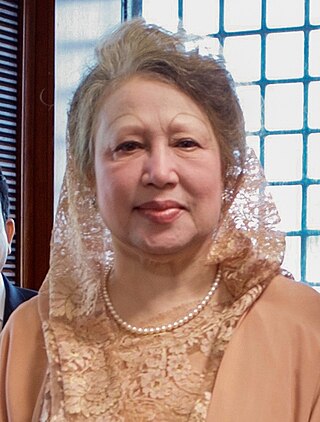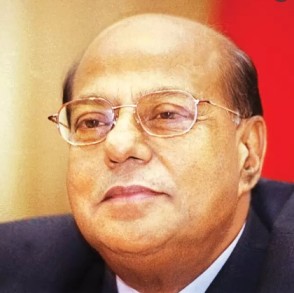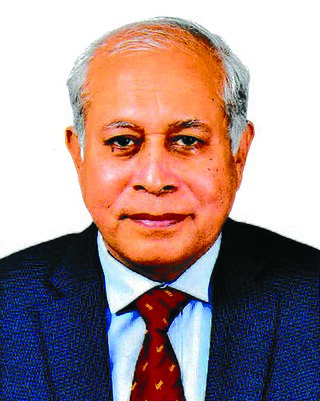Related Research Articles

Iajuddin Ahmed was the President of Bangladesh, serving from 6 September 2002 until 12 February 2009. From late October 2006 to January 2007, he also served as Chief Advisor of the caretaker government. From October 2006 to early 2008, his responsibilities as president included the Defense Ministry of the caretaker government.

Begum Khaleda Zia is a Bangladeshi politician who served as the prime minister of Bangladesh from March 1991 to March 1996, and again from June 2001 to October 2006. She was the first female prime minister of Bangladesh and second female prime minister in the Muslim world, after Benazir Bhutto. She is the widow of one of the former presidents of Bangladesh, Ziaur Rahman. She is the chairperson and leader of the Bangladesh Nationalist Party (BNP) since 1984, which was founded by her husband in 1978.

Dhaka Medical College and Hospital (DMCH) is a public medical college and hospital located in Dhaka, Bangladesh. Established on 10 July 1946, the college houses a medical school as well as a tertiary care hospital on its campus.

Shahabuddin Ahmed was a Bangladeshi politician who served as the President of Bangladesh from 1996 to 2001, and the Chief Justice of Bangladesh from 1990 to 1995. He previously served as the acting president during 1990–91 when Hussain Muhammad Ershad resigned from the post. He headed an interim government and held a general election in February 1991.

Abdur Rahman Biswas was a Bangladeshi politician. He was the President of Bangladesh from 1991 to 1996. Biswas represented Pakistan at the United Nations General Assembly prior to the independence of Bangladesh.

Abu Sayeed Chowdhury was a jurist and the second president of Bangladesh. Besides that, he held the positions of the Chairman of the United Nations Commission on Human rights, the vice-chancellor of the University of Dhaka, the Foreign Minister of Bangladesh and the first Bangladesh High Commissioner to the UK.

Mainul Hosein was a Bangladeshi lawyer and the publisher of the daily newspaper The New Nation. He was chairman of the editorial board of The Daily Ittefaq, whose building was shelled and completely demolished on 25 March 1971 by the Pakistan Army. He served as the law, information and land adviser to the immediate past interim Government of Bangladesh during January 2007 – January 2008.

Fakhruddin Ahmed is a Bangladeshi economist, civil servant, and a former governor of the Bangladesh Bank, the country's central bank. He also served as the acting prime minister of Bangladesh.

The Chief Adviser is the title of both the head of the abolished caretaker government and the 2024 interim government of Bangladesh, who serves as the head of government during the transition period between one elected government and another. With powers roughly equivalent to those of the prime minister of an elected government, their executive power is limited by the constitution. The Chief Adviser leads an Advisory Committee comprising several advisers, all of them selected from among politically neutral individuals to be acceptable to all major political parties.

Syed Modasser AliFRCS, FRCOpth is an ophthalmic surgeon from Bangladesh and was the Health, Family Welfare and Social Welfare adviser to the Bangladeshi Former Prime Minister Sheikh Hasina, from 2009 to 2013. He is the founder of Mojibunnessa Eye Hospital, the first registered eye hospital in Bangladesh and founding editor-in-chief of the Bangladesh Ophthalmic Journal, the first peer-review ophthalmic journal in Bangladesh. He is regarded as one of the pioneers of Community Ophthalmology and his book titled Community Ophthalmology, published in 1985, is considered to be the first textbook on the subject by the British Journal of Ophthalmology. He is currently overseeing the Bangladesh Community Clinic programme as chair of the board of trustees. He is an executive board member of the World Health Organization (WHO), having previously served on the board twice before.

Latifur Rahman was the 10th chief justice and the 2nd chief adviser of Bangladesh.
Anwarul Iqbal was an adviser of 2007–2009 interim caretaker government of Bangladesh. He was appointed as Local Government and Rural Development Minister & Labour Minister of the non-party interim caretaker government of Bangladesh on 17 January 2007 and remained in that post until elections were held two years later. Later he was given the charge of the Jute & Textile Ministry. He had the responsibility to head three ministries of the government of Bangladesh. He served as the 25th Inspector General of Bangladesh police. He went into voluntary retirement from the IGP post after he had been made officer on special duty and within few days he took charge as the adviser of the caretaker government headed by Fakhruddin Ahmed during the state of emergency in Bangladesh which was declared on 11 January 2007.

Mohammad Abdul Hadi was a Bangladeshi academic who served as the 4th Vice Chancellor of Bangabandhu Sheikh Mujib Medical University.

Rafique Ul Huq was a Bangladeshi barrister who served as the Attorney General of Bangladesh in 1990.
Abdul Majed was a Bangladeshi military officer who was convicted for his role in the assassination of Sheikh Mujibur Rahman, the founding president of Bangladesh.

Kanak Kanti Barua is a Bangladeshi neurosurgeon and academic. He served as the 10th vice chancellor of Bangabandhu Sheikh Mujib Medical University (BSMMU).

Abul Fayez Muhammad Khalid Hossain is a Bangladeshi Islamic scholar and currently serves as the Adviser for Religious Affairs in the Yunus interim government since 8 August 2024. His appointment marks the first time an Islamic scholar has held this advisory role in Bangladesh. He is also the Vice President of Hefazat-e-Islam Bangladesh and serves as the Education Adviser for Islami Andolan Bangladesh. He previously held the position of President of Islami Chhatra Samaj, the student wing of the Nizam-e-Islam Party. In academia, he is a visiting professor at the International Islamic University Chittagong and has previously served as an adjunct professor at the Asian University of Bangladesh. He was also the head of the Department of Islamic History and Culture at Omargani M.E.S. College. His editorial roles include serving as the editor of the monthly journal At-Tawheed and assistant editor of Balagh al-Sharq. He serves as a columnist for four national newspapers and has authored over two hundred research articles in a range of journals, including The Muslim World League Journal. He has published 20 books and was a key figure in editing volumes 3 to 9 of the second edition of the Islami Bishwakosh and the Sirat Encyclopedia, both published by the Islamic Foundation Bangladesh.

Bidhan Ranjan Roy is a member of the advisory council of the Bangladesh Interim Government. He served as director of the National Institute of Mental Health and Hospital's department of psychiatry.
References
- ↑ Rahman, Syedur (2010). Historical Dictionary of Bangladesh. Scarecrow Press. p. 329. ISBN 978-0-8108-7453-4.
- 1 2 "Former adviser to 1991 interim govt Dr MA Majed dies". bdnews24.com. 9 July 2017. Retrieved 25 May 2020.